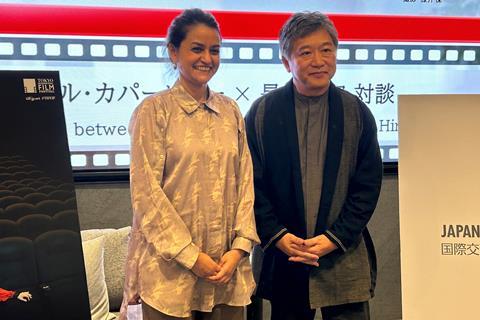
Filmmaker Payal Kapadia has addressed India’s decision to overlook her award-winning feature All We Imagine As Light, which had been hotly tipped for the best international feature film Oscar.
Speaking with Japanese auteur Hirokazu Kore-eda at Tokyo International Film Festival today, Kapadia said: “With this film, we got a lot already so I’m very satisfied with how the journey of the film has gone. It’s been really more than I expected at all so everything that comes its way is a bonus to me.”
She later commented how she “greatly admired” Kiran Rao, the director of Laapataa Ladies, which was submitted to the Academy by the Film Federation of India (FFI).
All We Imagine As Light was considered the frontrunner for selection after becoming the first Indian film to play in Competition in Cannes in 30 years and saw Kapadia become the first Indian female filmmaker to win the Grand Prix at the festival.
The film, which is a France-India-Netherlands-Luxembourg co-production, also made the four-strong shortlist of France’s Oscar committee and Kapadia singled out French funding for praise.
Kore-eda was on the Competition jury at this year’s Cannes and revealed he first approached Kapadia at the festival’s afterparty, once the awards had been handed out. When compiling this year’s TIFF Lounge Talks, which he helps organise with the festival, Kapadia was the first name he mentioned.
The two discussed her career to date, which included study at the Film and Television Institute Of India after a “miserable” five years working as an assistant director and her first documentary feature, A Night Of Knowing Nothing, for which Kapadia won the Golden Eye at Cannes in 2021 where the film played in Directors’ Fortnight.
When Kore-eda asked if many in the Indian film business move toward working on “singing and dancing movies” such as a RRR, Kapadia said: “It’s not easy to sustain a career in independent movies. For a lot of people, it’s not a choice going to mainstream industry because we don’t have a support system after film school and people need to earn money. Film schools used to have a connection with the national TV channel and people would be supported but now there is no such structure.”
A release in Japan is planned for July 2025. Sideshow and Janus Films will release in the US on November 14. Speaking about the upcoming India release on November 22, Kapadia quipped: “They will need to do promotion because nobody wants to go to cinemas anymore. It’s very sad.”
The drama, which has played a raft of festivals since Cannes, it follows two nurses with troubled relationships in Mumbai who head off on a road trip to a beach town.
Reflecting on the themes of family that are tackled in the film, Kapadia said: “It’s good to raise these questions but how they land [with the audience in India] is always complicated. But that doesn’t mean we stop. We have to continue to ask these questions, continue to express these feelings that we have about society. That’s our job. I hope people respond to it in the way that it was intended.”



































No comments yet